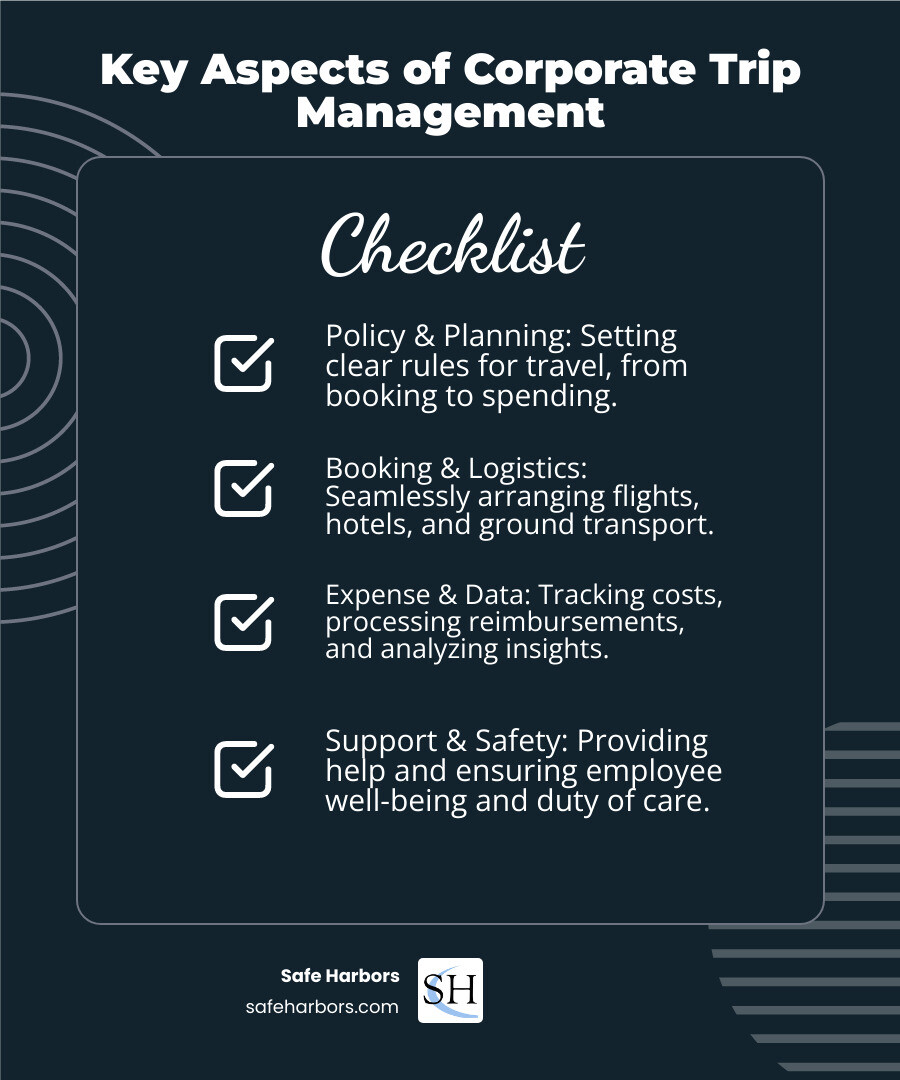Understanding Corporate Trip Management
Corporate trip management is the process of overseeing and optimizing employee travel for business purposes. While it can be an administrative headache, smart management turns this expense into a powerful investment.
Efficiently managing your company's travel generally involves:
- Policy & Planning: Setting clear rules for travel, from booking to spending.
- Booking & Logistics: Arranging flights, hotels, and ground transport seamlessly.
- Expense Management: Tracking costs, processing reimbursements, and spotting savings.
- Traveler Support: Providing help and ensuring safety for employees on the road.
- Data & Insights: Analyzing travel data to make better decisions and improve programs.
The global business travel market is set to reach a staggering $829.5 billion by 2027, showing just how vital it is for connecting people and growing companies.
Crucially, for every dollar invested in business travel, companies can earn $12.50 or more in new revenue. This makes it clear that managing business travel isn't just about cutting costs—it's about enabling growth.
This guide will show you how to streamline processes, keep travelers safe, and get the best value from every business trip.

What is Corporate Travel Management and Why is it Crucial?
Corporate travel management is the strategic oversight of your company's business trips. It’s a comprehensive approach to ensure every travel activity is cost-effective, efficient, and prioritizes the well-being of your team. This is often handled by a dedicated partner, like a Travel Management Company (TMC) such as Safe Harbors.
Why is this crucial? Business travel is a powerful investment in growth, collaboration, and market expansion. When managed thoughtfully, it becomes a strategic advantage that boosts your bottom line.
Here's why:
- Cost Control: A smart program helps secure better rates, set clear spending limits, and track every dollar for a healthier budget.
- Efficiency: Streamlined processes for booking, approvals, and expense reports save time, allowing employees to focus on core responsibilities.
- Traveler Safety and Well-being: Ensuring employee safety on the road is a moral and legal responsibility. Effective management includes risk assessments, real-time support, and emergency plans.
- Compliance: A well-defined program ensures all travel adheres to company guidelines and external regulations, minimizing risk.
- Strategic Growth: Strategically managed travel is a tool for achieving business goals, whether it's closing deals, fostering innovation, or expanding into new markets.
Effective corporate trip management turns a potentially chaotic expense into a smooth, strategic operation. Learn more in our guide on 5 More Benefits of Corporate Travel Management.
The Core Components of Effective Corporate Trip Management
An effective corporate trip management program is a system where each part works in harmony. Here are the core components:
- Travel Policy Development: The foundation of your program, providing clear guidelines on booking, preferred vendors, expense limits, and approvals.
- Pre-trip Approval Workflows: A structured process to ensure travel is necessary, budgeted, and aligned with company goals, controlling costs and risk.
- Booking and Reservations: Easy-to-use booking tools, like those from our elite tech partnerships, provide a seamless experience for self-booking or our concierge service.
- Expense Management and Reimbursement: Automated systems for tracking, submitting, and reimbursing travel expenses efficiently, reducing errors and saving time.
- Risk Management and Duty of Care: Our top priority is traveler safety, involving risk assessments, traveler support, and robust emergency plans.
- Data Analysis and Reporting: We collect and analyze travel data to monitor spending, identify trends, and uncover savings opportunities for smarter decisions.
- Vendor Negotiation and Relationships: Strong ties with travel providers allow us to negotiate special rates and exclusive deals, maximizing your travel budget.
This structured approach is fundamental to success, as outlined in our Your 6-Step Guide to Making the Move to Managed Travel.
The Power of a Formal Business Travel Policy
A formal business travel policy is a strategic document that benefits both the company and its employees. Without one, travel can lead to inflated expenses and administrative headaches.
Here’s why a clear policy is a game-changer:
It delivers significant Cost Savings. By stating preferred vendors, setting spending limits, and encouraging early bookings, you can dramatically reduce travel costs.
It ensures smooth Policy Compliance. A clear policy reduces out-of-policy bookings and simplifies the auditing process for your finance team.
It boosts Employee Satisfaction and Clarity. When expectations are clear, your team feels more confident and less stressed about booking and expensing trips, removing guesswork.
It offers Legal Protection. A policy that includes duty of care provisions helps you meet your legal obligations to protect employees while they travel for work.
Finally, it promotes Fairness and Equity. A consistent policy ensures all employees are treated fairly, building trust and morale across the organization.
A well-defined policy empowers employees to make smart choices and simplifies processes for everyone. For more insights, check out our Business Travel Policy resources and learn How to Update Your Travel Policy to Fit Your Corporate Culture.
Overcoming Problems in Corporate Trip Management
Managing your company's business travel can be complex, with challenges like surprise expenses and tricky bookings. However, these issues in corporate trip management are opportunities to make your program smoother, smarter, and more cost-effective.
Common headaches often stem from scattered booking systems, unclear policies, or a lack of traveler support. By identifying the root causes, we can implement clever solutions and help you avoid the pitfalls we discuss in our guide on Nightmares of Corporate Travel and How to Avoid Them.
Common Challenges and How to Solve Them
Let's tackle the most common bumps in the road for corporate trip management and explore how to smooth them out.
A major challenge is decentralized booking, where employees book travel across various websites. This leads to missed savings, fragmented data, and a lack of oversight. The solution is to centralize bookings through one platform or a trusted travel management company (TMC). This consolidates data, open ups better rates, and ensures policy adherence. Our flexible booking tools at Safe Harbors provide a seamless, one-stop shop for all travel needs.
Another hurdle is low policy compliance. Employees may not follow the travel policy if it's unclear or inconvenient, leading to unexpected costs. The fix is to create clear, accessible policies and use automated pre-trip approval systems. User-friendly booking tools that guide employees toward compliant choices are also key. If you're struggling with buy-in, our article on 7 Signs Your Employees Aren't Buying Into Your Travel Policies offers great insights.
Inaccurate expense reporting is a common headache, causing errors and delays. The smart move is to adopt automated expense management solutions. Integrating these tools with booking systems enables real-time tracking, digital receipt capture, and automated reconciliation, which speeds up reimbursements and reduces mistakes.
Finally, traveler dissatisfaction can lower morale and productivity. Unhappy travelers may struggle with clunky tools or feel unsupported. The solution is to prioritize their experience with user-friendly booking platforms, 24/7 support, and robust duty of care plans. Our concierge management at Safe Harbors delivers this white-glove service, because happy, safe travelers are productive travelers.
If you're weighing your options for managing these challenges, our piece on The Pros and Cons of Outsourcing Travel Management is a great place to start.
7 Proven Ways to Reduce Business Travel Costs
Keeping business travel costs in check is a top priority. The secret isn't cutting corners but being strategic with your spending. Here are 7 proven ways we help businesses save on corporate trip management:
- Negotiated Rates: Work with a TMC to access exclusive deals with airlines, hotels, and car rental companies that aren't available to the public.
- Advance Booking: Make it a policy to book flights and accommodations well in advance, as last-minute travel is almost always more expensive.
- Flexible Travel Dates: Encourage shifting a trip by a day or two to take advantage of lower fares, especially by avoiding peak travel days.
- Consolidating Trips: Combine multiple meetings in the same region into a single trip to save on transport and accommodation costs.
- Preferred Vendors: Establish a list of specific airlines, hotel chains, and car rental companies to concentrate your spending and negotiate deeper discounts.
- Expense Tracking and Auditing: Implement robust systems to get a clear picture of where travel dollars are going, spot out-of-policy spending, and identify optimization opportunities.
- Incentivizing Savings: Consider offering small rewards to employees who consistently choose cost-effective options, building a culture of smart spending.
By weaving these strategies into your program, you can achieve significant savings. For more guidance, see our insights in 7 Fundamental Ways Corporate Travel Management Saves Money and our tips on how to Reduce Business Travel Expenses.
The Modern Toolkit: Technology, Safety, and Sustainability
Successful corporate trip management today requires a modern toolkit that integrates technology, prioritizes traveler safety, and champions sustainability. This holistic approach ensures business travel is efficient, cost-effective, secure, and responsible.

Technology streamlines processes, duty of care ensures your people's well-being, and sustainability addresses your environmental impact. Together, these pillars form the bedrock of forward-thinking travel management. At Safe Harbors, we continuously explore advancements in Technology, leveraging flexible booking tools and elite tech partnerships to deliver unparalleled service.
Leveraging Technology to Streamline Operations
In corporate trip management, technology is the engine of efficiency and innovation. The right tools transform complex processes into seamless workflows.
Here's how technology streamlines operations:
Online Booking Tools (OBTs) empower employees to book their own travel within company policy. Our flexible booking tools, powered by elite tech partnerships, make booking quick and compliant.
Mobile Apps are essential for the modern traveler. They provide real-time itinerary updates, 24/7 support access, and on-the-go expense reporting, acting as a personal travel assistant.
AI-Powered Insights are revolutionizing travel data analysis. AI can identify cost-saving opportunities, predict travel patterns, and personalize recommendations to optimize savings.
Automated Expense Reporting eliminates paper receipts. These systems allow travelers to capture receipts digitally and submit reports with ease, reducing manual errors and speeding up reimbursement.
Centralized Dashboards provide a real-time overview of all travel activity, spend, and policy compliance, offering control without compromising traveler flexibility.
Integrating these solutions simplifies the travel process and provides the oversight needed to optimize your program, helping you Skyrocket Corporate Productivity With a TMC.
The Critical Role of Duty of Care and Traveler Safety
In corporate trip management, duty of care is a profound legal and moral obligation to protect employees from foreseeable harm while they travel for work.
This commitment involves several critical components:
- Risk Assessment: We proactively assess potential risks at the destination, including political instability, health concerns, and natural disasters.
- Traveler Tracking: Real-time tracking is crucial for rapid response in an emergency, enabling immediate communication if an incident occurs.
- 24/7 Support: Our concierge management service ensures travelers have round-the-clock assistance for re-bookings, medical emergencies, or other challenges.
- Emergency Response Plans: We have pre-defined plans for various scenarios, including communication strategies and evacuation procedures.
- Pre-trip Information and Alerts: We equip travelers with essential destination information and provide real-time alerts about evolving situations during their trip.
Our dedication to duty of care is central to our white-glove service. A secure traveler is a productive traveler. Learn more about our Travel Risk Management services and The Compelling Security Benefits of Corporate Travel Management.
Ensuring Sustainability in Your Travel Program
Corporate trip management carries an environmental footprint, and ensuring sustainability is a growing imperative. We believe in making conscious choices to minimize our impact.
Here's how we approach sustainability in corporate travel:
- Carbon Footprint Monitoring: We use tools to report on carbon emissions from business travel, providing a clear picture of our impact and identifying areas for improvement.
- Eco-Friendly Travel Options: We encourage and prioritize options like direct flights, economy class travel, and choosing trains over short-haul flights where feasible.
- Carbon Offsetting: For unavoidable emissions, we facilitate carbon offsetting programs that invest in projects to reduce greenhouse gases elsewhere.
- Green Travel Policies: We integrate sustainability into travel guidelines, such as setting emission reduction targets or encouraging virtual meetings.
- Regulatory Compliance: We stay informed and comply with evolving environmental regulations, like the EU's sustainability reporting directive.
By focusing on these practices, we aim to make business travel not just efficient and safe, but also environmentally responsible.
Measuring Success and Looking to the Future
Once your corporate trip management program is in place, the next step is to measure its success and prepare for the future. This means understanding your return on investment (ROI) and keeping an eye on emerging industry trends.

Measuring success confirms your strategies are working and highlights areas for improvement. Looking ahead ensures your program remains flexible and competitive. This forward-thinking approach is key to navigating the News and Trends in Corporate Travel: Managing World Troubles to Transparent Travel Data.
How to Measure the ROI of Your Travel Program
Calculating the ROI of your corporate trip management program goes beyond cost savings; it's about understanding the broader business impact. Here’s how to see the full value:
- Cost-per-Trip Analysis: Analyze the average cost of different trip types to understand spending patterns and find savings opportunities, including both direct and indirect costs.
- Policy Compliance Rates: High compliance indicates your policies are clear and effective. Tracking this metric helps control costs, as non-compliant bookings are often more expensive.
- Traveler Satisfaction Surveys: Happy travelers are more productive. Regularly survey employees on their experience with the booking process and support to gauge satisfaction and boost morale.
- Business Outcomes: Connect travel to key business goals. Did a sales trip land a new client? Did a conference lead to a new partnership? Positive outcomes are a clear sign of strong ROI.
- Time Savings: Calculate the hours saved by travelers and administrative staff due to streamlined booking, approval, and expense reporting processes. These efficiency gains contribute directly to your ROI.
By tracking these metrics, you can demonstrate the true worth of your travel program. It's a balancing act we explore in The Business Travel Manager's Dilemma: Keeping Finance and Your Travelers Happy.
The Future of Corporate Trip Management: Key Trends to Watch
The world of business travel is constantly evolving. Staying ahead of these key trends is vital for excellent corporate trip management.
- Artificial Intelligence (AI): AI will deliver personalized booking suggestions, identify savings, and provide proactive travel alerts, making travel smarter and more intuitive.
- New Distribution Capability (NDC): This airline data standard provides travel platforms with more direct and flexible flight options, leading to more choices and potentially better deals.
- The Rise of 'Bleisure' Travel: More employees are extending business trips for personal leisure. Travel programs must be flexible enough to support this trend while keeping business expenses within policy. Learn more about Enjoying Your Business Travel: The Rising Tide of Bleisure.
- Hyper-Personalization: Using data, travel experiences will become highly customized to individual preferences, loyalty programs, and travel history, all within company policy.
- Focus on Traveler Well-being: Companies are expanding their focus beyond safety to include the overall health of their travelers, supporting mental health, fitness, and comfort on the road.
- Sustainability as a Core Metric: Environmental impact will become a key performance indicator. Programs will regularly track carbon footprints, promote greener travel options, and use carbon offsetting as standard practice.
These trends show a shift toward smarter, more traveler-centric, and responsible corporate trip management.
Frequently Asked Questions about Corporate Trip Management
Here are answers to some of the most common questions about making business travel smooth and successful.
What is the difference between a travel agent and a corporate travel management company?
A traditional travel agent typically focuses on booking individual trips. A corporate travel management company (TMC) like Safe Harbors provides a comprehensive, strategic program to optimize all of a company's travel. This includes creating travel policies, negotiating vendor rates, managing risks, analyzing data for insights, and providing 24/7 traveler support. The goal is to turn travel spend into a strategic investment while ensuring employee safety.
How can a small business benefit from corporate travel management?
Small businesses benefit significantly from corporate travel management. A TMC provides access to negotiated rates and discounts for flights, hotels, and car rentals that are usually reserved for large corporations, leading to immediate savings. It also saves valuable administrative time by handling bookings and logistics, and it ensures employee safety through robust duty of care protocols. A TMC offers a professional, scalable framework that supports a small business as it grows.
What is "duty of care" in business travel?
"Duty of care" is a company's legal and moral obligation to protect its employees from foreseeable harm while they are traveling for work. It means ensuring their safety and well-being throughout their journey. This involves conducting pre-trip risk assessments, providing real-time alerts about developing situations, offering 24/7 emergency assistance, and having clear safety protocols in place. Our concierge management is designed to deliver on this promise, giving you peace of mind. For more details, refer to Why Implementing a Travel Risk Plan for Employees is Crucial.
Conclusion
Effective corporate trip management doesn't have to be a source of headaches or uncontrolled spending. By adopting a strategic approach, you can transform business travel into a powerful engine for growth and a boost to employee well-being.
The solution lies in weaving together key ingredients: clear policies, cutting-edge technology, a steadfast commitment to duty of care, and a focus on sustainability. When these elements work in harmony, the benefits are clear: significant cost savings, improved efficiency, and a safer, more satisfying experience for your traveling workforce.
A well-managed travel program is a competitive advantage. It empowers employees, strengthens your financial health, and aligns with your company's values. By focusing on policy, technology, and safety, you can transform travel from a simple expense into a strategic investment.
At Safe Harbors, we live this philosophy. We deliver global business travel solutions with an best response speed and comprehensive white-glove service. Our fast response support, flexible booking tools powered by elite tech partnerships, and dedicated concierge management with duty of care are all designed to make your corporate trip management experience seamless and effective.
Ready to optimize your travel strategy? We invite you to explore our comprehensive business travel services.







